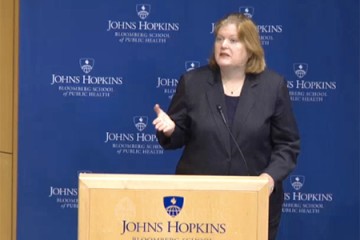One of the many troubling spillover effects of the Syrian civil war is the disruption of the country's health care field, including lost jobs and training opportunities for health workers.
"There are thousands and thousands of Syrian health care workers who are either not able to practice or not able to continue their education because of the war," says Paul Spiegel, who directs the Johns Hopkins' Center for Humanitarian Health.
To address this issue, Johns Hopkins is now offering a new opportunity for two Syrian students: a full ride to its Master of Public Health program.
The award, through the Bloomberg School of Public Health, covers full tuition to the 11-month master's program starting in July 2017. Candidates who qualify are Syrians who have been displaced by their country's conflict and currently reside in Egypt, Lebanon, Jordan, Turkey, or in the U.S. under Temporary Protected Status.
The scholarship applications are due by Jan. 31, and decisions will be made by early spring.
Spiegel says the idea emerged during a recent trip he made to Beirut to partake in a commission sponsored by The Lancet addressing health challenges of the Syrian crisis. During the events, Spiegel brainstormed with the president of the Syrian American Medical Society on ways educational institutions such as Johns Hopkins might help public health workers progress in their training.
When he returned to Baltimore, Spiegel pitched the new scholarship to Michael J. Klag, dean of the Bloomberg School, who immediately warmed to the idea.
"Syria is in the midst of the greatest humanitarian crisis since World War II," Klag says. "The Bloomberg School is pleased to provide this opportunity for Syrian students to obtain skills in public health to help address the health needs of Syrian refugees."
Spiegel, who himself earned a Masters of Public Health from the Bloomberg School in 1996, rejoined Hopkins last July after serving as a high-ranking official with the United Nations Refugee Agency.
He says the Center for Humanitarian Health—formerly the Center for Refugee and Disaster Response—is "sending the word out far and wide" about the new scholarship through UN networks and various expatriate associations. Given the short timeline, prospective candidates will be those who are already actively exploring U.S. public health programs, after completing a variety of requirements such as TOEFL tests.
The center is also consulting with the UN Refugee Agency to work out any potential challenges with visa issues or refugee status for applicants, Spiegel says.
Those interested in applying can find full details on the Center for Humanitarian Health's Facebook page or email mphprog@jhu.edu for more information.
Posted in Health, University News, Politics+Society
Tagged public health, syria








